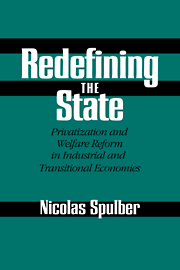Preface
Published online by Cambridge University Press: 29 March 2010
Summary
This book examines, in historical perspective, changes in the role of the state with regard to public ownership and the scope of welfare in the main industrial and transitional economies. These changes have stimulated illuminating debates on the state's size, range, and functions. They have also involved important transformations – the shifting of boundaries between the public and private sectors, the carrying out of large privatization programs, and the reevaluation of the nature and content of public welfare. These debates and transformations are of singular importance for understanding the actual and potential scope of the state in any economy.
The term industrial economies refers herein first and foremost to the main Western European countries – namely, the United Kingdom, France, and Germany – and to the United States. Whenever appropriate, the framework is expanded to include the entire so-called Group of Seven (G7) industrialized countries. The term transitional economies refers first of all to Russia and, whenever necessary, to its former Central and Southern European satellites. I believe that the developments in these Western and Eastern countries since World War I concerning public ownership and welfare present compelling correspondences, notwithstanding great differences in scope, timing, and type of system. These correspondences deserve to be brought to light and examined on a comparative basis. (The focus on West and East as defined does not mean, of course, that detailed examinations of germane reforms in other countries are of less importance or interest.)
- Type
- Chapter
- Information
- Redefining the StatePrivatization and Welfare Reform in Industrial and Transitional Economies, pp. xi - xviPublisher: Cambridge University PressPrint publication year: 1997

